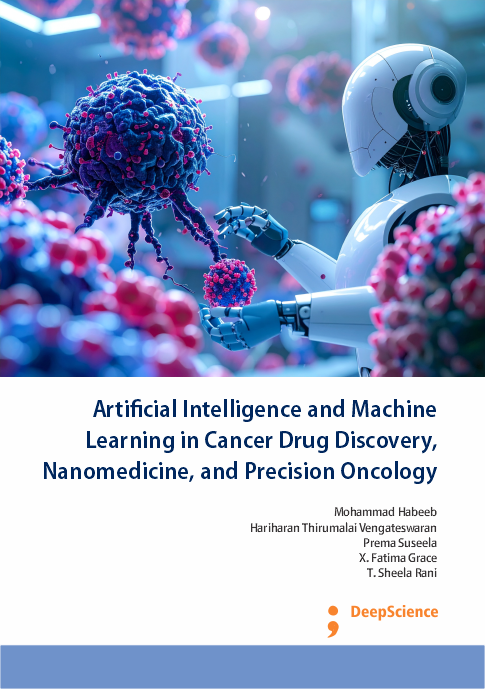Artificial Intelligence and Machine Learning in Cancer Drug Discovery, Nanomedicine, and Precision Oncology
Keywords:
Artificial Intelligence, Machine Learning, Cancer Drug Discovery, Precision Oncology, Nanomedicine, Nanoparticles, Drug Delivery SystemsSynopsis
One of the most difficult medical problems of the twenty-first century is still cancer. The complexity and variety of cancer continue to restrict the efficacy of traditional methods, despite notable advancements in molecular biology, pharmacology, and clinical practice. From medication development to patient treatment, the process is drawn out, costly, and prone to failure. Simultaneously, the amount of biological data from imaging to genomics to electronic health records has increased rapidly, far exceeding human processing capabilities. In this context, machine learning (ML) and artificial intelligence (AI) have become revolutionary forces that have the potential to completely reshape the field of cancer, rather than being supplementary tools. This book serves two purposes. Its first goal is to give a thorough but understandable summary of the present applications of AI and ML in cancer treatment and drug development. Secondly, it aims to stimulate contemplation about the future. Readers will acquire a thorough grasp of this quickly developing topic through in-depth research, case studies, and discussion of useful tools and platforms. We also look at the difficulties with clinical integration, ethics, and regulations that arise with using AI in high-stakes healthcare settings. Concerns of bias, openness, patient privacy, and safety are not incidental; rather, they are essential to creating reliable and clinically significant systems.
Researchers, physicians, data scientists, students, healthcare innovators, and policymakers are among the many groups of people this book is meant towards. We hope that this volume will be a source of inspiration and guidance for those who are new to the area or actively involved in determining its future. Human knowledge and machine intelligence will need to work together as cancer therapy moves toward a more data-driven, predictive, and personalized paradigm. In order to provide faster, safer, and more individualized therapies, the ultimate goal is not just to further science but also to enhance lives.
References
W. Cui, A. Aouidate, S. Wang, Q. Yu, Y. Li, S. Yuan, Discovering Anti-Cancer Drugs via Computational Methods, Front Pharmacol 11 (2020). https://doi.org/10.3389/FPHAR.2020.00733/FULL.
P. Czechowicz, A. Więch-Walów, J. Sławski, J.F. Collawn, R. Bartoszewski, Old drugs, new challenges: reassigning drugs for cancer therapies, Cell Mol Biol Lett 30 (2025). https://doi.org/10.1186/S11658-025-00710-0.
M. Habeeb, H.T. Vengateswaran, K. Navyaja, P. v, Nanomedicines: Smart Oncology Treatment, Nanomedicines: Smart Oncology Treatment (2024). https://doi.org/10.58532/NSOT.
H. Mohammad, H.W. You, M. Umapathi, K.K. Ravikumar, Hariyadi, S. Mishra, Strategies of Artificial intelligence tools in the domain of nanomedicine, J Drug Deliv Sci Technol (2023) 105157. https://doi.org/10.1016/J.JDDST.2023.105157.
F. Yang, J.A. Darsey, A. Ghosh, H.-Y. Li, M.Q. Yang, S. Wang, Artificial Intelligence and Cancer Drug Development, Recent Pat Anticancer Drug Discov 17 (2021) 2–8. https://doi.org/10.2174/1574892816666210728123758.
M. Habeeb, H. Woon You, K. Balasaheb Aher, G. Balasaheb Bhavar, S. Suryabhan Pawar, S. Dnyaneshwar Gaikwad, Artificial neural networks for the prediction of mechanical properties of CGNP/PLGA nanocomposites, Mater Today Proc (2023). https://doi.org/10.1016/J.MATPR.2023.08.354.
M. Habeeb, H.T. Vengateswaran, H.W. You, K.B. Aher, G.B. Bhavar, S.D. Gaikwad, Development and characterization of carboxylated copper oxide conjugated polymeric nanocomposites and correlating with computational techniques, Results in Surfaces and Interfaces 17 (2024) 100323. https://doi.org/10.1016/J.RSURFI.2024.100323.













